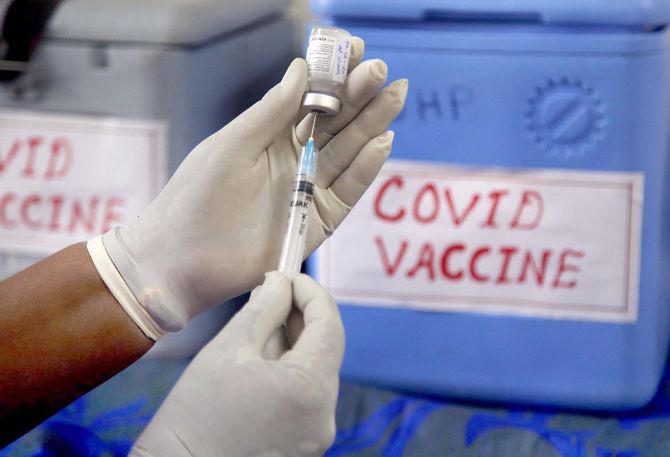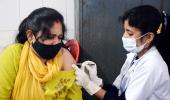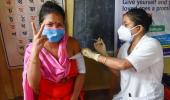The COVID-19 vaccines can be "tweaked" to provide protection against new variants of the virus, All India Institute of Medical Sciences (AIIMS), Delhi, Director Dr Randeep Guleria said.

His remarks come amid rising cases of the Omicron variant of coronavirus and the ongoing debate about whether a booster shot is needed to increase antibodies.
Speaking at a programme organised here in Maharashtra on Sunday, Dr Guleria said that as far as the severity of the Omicron variant is concerned, the next few weeks will be very crucial.
"Although there is this new variant of COVID-19, the silver lining is that it does seem to be a milder disease and we should have protection as far as the vaccine is concerned. And I think it is important to remember that vaccines can be tweaked," Dr Guleria here said on Sunday.
"We will have second-generation vaccines. This is something which we need to keep in mind. The current vaccines are effective but with new variants, they will decrease on immunity, however vaccines can be tweaked," he added.
He was speaking at the Dr V S Prayag Memorial Oration 2021 organised here in Maharashtra by the Association of Physicians of India.
The government in May had further extended the gap between the two doses of Covishield from 6-8 weeks to 12-16 weeks.
Bharat Biotech's Covaxin is currently administered in a two-dose regimen with a gap of four to six weeks.
"Every year, a new vaccine (for diseases in general) is created based on surveillance data provided by the World Health Organisation (WHO), therefore it is easier to do it," Dr Guleria said.
While Omicron was first reported in South Africa on November 24, India's first two cases of this heavily mutated version of the coronavirus were detected in Karnataka on December 2.
Till Sunday, 153 cases of Omicron were reported in 11 states and Union Territories in India.
Dr Guleria said the production of new vaccines each year demonstrates that it is possible to adapt existing vaccines to keep up with viral mutations.
Speaking about the tweaking of vaccines, he said that it is being done for the influenza vaccine.
"There are also studies going on about if we can have a bivalent COVID-19 vaccine. Let's say the Delta variant and Beta variant combined into one vaccine that makes a bivalent vaccine," he said.
Talking about the Omicron strain, Dr Guleria said that it appears to escape humoral immunity.
"As per the preliminary reports from South Africa, there is a high risk of infection in individuals previously infected with a different strain. To validate this we need more data," he said.
As far as the severity of the (viral) disease is concerned, more data is needed. "The data from SA suggests that it is just a milder form of the disease. But there is a counterargument that it is currently affecting the younger age group," Dr Guleria added.
He said that as far as the severity of the Omicron variant is concerned, the next few weeks will be very crucial.
In his presentation, Dr Guleria mainly stressed three points - COVID-19 burden and AIIMS' contribution, the effect of COVID-19 on the lungs and lessons learned, and the way forward.
He added that new variants will continue to emerge and mutations will take place.
"The virus will also be more transmissible. It has to spread rapidly for its survival. So if we put our guards down, in terms of COVID appropriate behaviour (CAB), it will further add to the transmission," Dr Guleria said.
He said CAB and vaccination are very important tools in this aspect.
Dr Guleria said genome sequencing has become more and more important in view of the emergence of new variants and it needs to be done on a large scale.
Speaking about the challenges on the vaccination front, he said that equitable distribution to billions of people is very important.
On the lessons learned and the way forward, Dr Guleria said that the increasing frequency of epidemics and pandemics can be seen in the 21st Century.
"Just look at the 20 years of data. What has happened? We started with H5N1 which was bird flu, we had SARS, MERS, then we had H1N1. We had outbreaks of Ebola, ZIKA...so what are we seeking, unlike the 20th century more infections..and all of them were of 'zoonotic origin," he added.
Dr Guleria said increased activities like trade, travelling, connectivity, growing urbanisation, encroaching on the environment, and global warming etc. are some of the reasons for the rise in infections.
Speaking about the 'One Health Concept,' he said that human health and animal health are interdependent and linked to the health of the ecosystem of which they are part.
"Hence we need to work on the solution at the local and global level keeping in mind to prevent future pandemics," he added.











 © 2025
© 2025